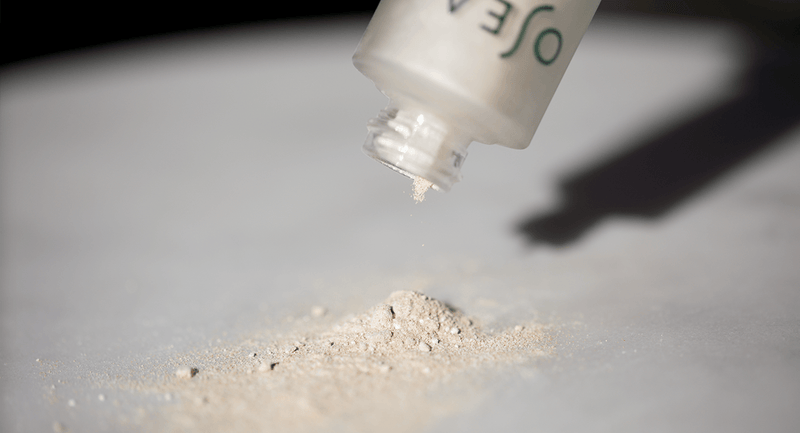Vitamin C is an active antioxidant that can help our bodies defend against cellular aging by fighting free radicals. Simply put, free radicals are incomplete atoms¹. They lack a full shell of orbiting electrons and therefore look to bond with other atoms, like the atoms in our healthy skin cells.
Free radicals can wreak havoc on our skin, creating damage known as oxidative stress. Resulting issues include collagen loss, fine lines, wrinkles, hyperpigmentation, and dullness. To combat these aggressive incomplete atoms, vitamin C is able to donate electrons to help to neutralize free radicals and their destructive behavior before oxidative stress takes its toll on your skin.
Vitamin C is a notoriously unstable ingredient to formulate with. It can quickly lose its potency when exposed to light and air, so it is imperative that it be formulated with care and consideration. But is vitamin C good for your skin, even with these unique qualities? The short answer is yes—no matter your skin type, there are several ways vitamin C can work for you.
Now let’s get into the good stuff: using vitamin C for skin health.
Vitamin C Benefits for Skin
Protection Against Free Radicals
Like we said before, vitamin C is an active antioxidant. Its job is to bind with free radical compounds to neutralize them. This makes it the perfect ingredient to protect skin from the daily stress of our modern environment. When skin is exposed to the sun, free radicals are produced that trigger inflammation², which can lead to premature aging and unwanted pigmentation, like sunspots. When used alongside sunscreen, vitamin C neutralizes those free radicals³ and keeps your skin in a safe and happy state.
Boosted Collagen
Vitamin C is also a powerful player in the game of collagen production4. Studies have shown that it is a primary factor in stabilizing and creating collagen molecules, making it among the most effective anti-aging ingredients. In short, Vitamin C can help encourage the growth and production of collagen and help new collagen be better and stronger. Since collagen plays an important role in skin’s elasticity, having a greater amount of quality collagen can go a long way in helping your skin retain a smooth, supple quality.
Brown Spot Reduction
Last, but certainly not least, vitamin C has a great effect on decreasing pigmentation in the skin². Specifically, vitamin C interrupts melanogenesis, the process in which skin cells create pigment. When melanogenesis in the cells is disturbed, by a blemish for example, the pigmentation process can result in undesirable spots often referred to as hyperpigmentation. Similarly, prolonged sun exposure can increase melanin production, leading to brown spots. Vitamin C can help prevent these spots from occurring⁵ and help with their healing.
Refining Your Routine to Maximize Vitamin C Skin Benefits
With daily use, vitamin C can help keep skin healthy and defend against free radicals, like those produced by the sun, pollution, stress, and more. This active ingredient can be applied both morning and night, but if you apply in the morning there are bonus points for pairing your vitamin C products with sunscreen. The potent vitamin can add protection from the sun and free radical formation during the day. By layering the two, you’re getting a powerful mix of antioxidants and SPF to defend against the sun's harsh UVA and UVB rays.
Citations
1. Villines, Z. (29 July 2017). How do free radicals affect the body? Medical News Today. Retrieved on March 27, 2023, from
https://www.medicalnewstoday.com/articles/318652
2. Pullar, J., Carr, A., and Vissers, M. (12 August 2017). The Roles of Vitamin C in Skin Health. Nutrients. Retrieved on March 27, 2023, from
https://www.ncbi.nlm.nih.gov/pmc/articles/PMC5579659/
3. Magnesium Ascorbyl Phosphate: A Stable Form of Vitamin C. Is it Really as Good as Other Vitamin C Ingredients? The Derm Review. Retrieved on April 21, 2023, from
https://thedermreview.com/magnesium-ascorbyl-phosphate/
4. Gref, R., Deloménie, C., Masksimenko, A., et. al. (9 October 2020). Vitamin C-squalene bioconjugate promotes epidermal thickening and collagen production in human skin. Scientific Reports. Retrieved on March 27, 2023, from
https://www.nature.com/articles/s41598-020-72704-1
5. Pullar, J.M, Carr, A.C, and Vissers, M. (12 August 2017). The Roles of Vitamin C in Skin Health. Nutrients. Retrieved on March 28, 2023, from
https://www.ncbi.nlm.nih.gov/pmc/articles/PMC5579659/
